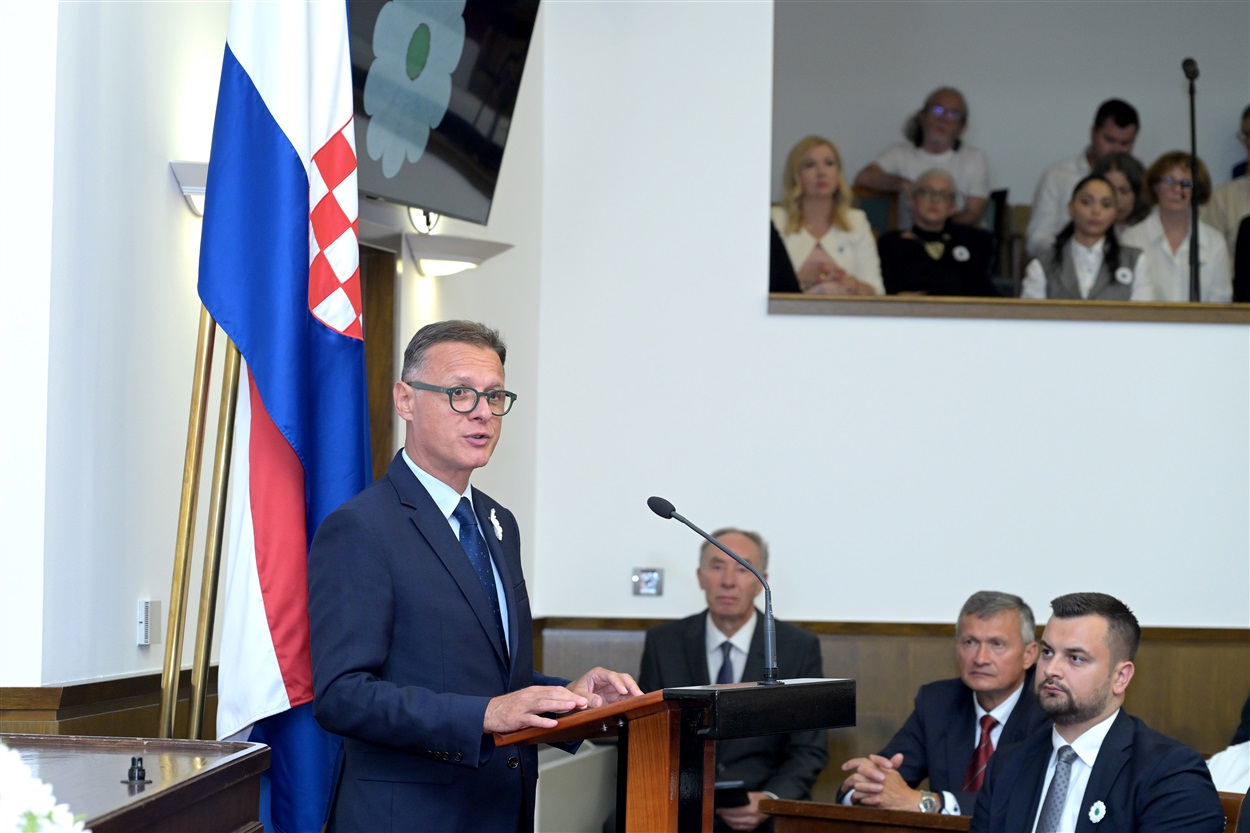
Zagreb - The Croatian parliament held a commemoration on Friday for 11 July, the Day of Remembrance for the Genocide in Srebrenica and the 29th anniversary of the Srebrenica tragedy, welcoming the adoption of the UN Resolution on the Srebrenica Genocide and warning against attempts to downplay the tragedy.
The UN Resolution clearly communicated to the world what we were already aware of, that a clear and unequivocal act of genocide occurred in Srebrenica, said Speaker and commemoration sponsor Gordan Jandroković.
He recalled that the Resolution designated 11 July as the International Day of Reflection and Commemoration of the 1995 Genocide in Srebrenica and urged all UN member states to observe this day.
Jandroković said the acknowledgment of those horrific crimes and repentance had been awaited for three decades, if not longer, in Bosnia and Herzegovina and Croatia. Instead, we witness some attempting to downplay those crimes, either by adopting their own resolutions to divert attention from those passed by the UN or by calling facts lies, all in fighting for a better past, he added.
Jandroković: We saw through the disgraceful act in the Montenegrin parliament
He said the downplaying of the Srebrenica tragedy and its exploitation for political purposes should be equally condemned.
"Just a week ago, a perfidious attempt was made in the Montenegrin parliament to divert attention from the crimes committed in Srebrenica. Both we in Croatia and the rest of the EU quickly saw through this manipulative, harmful, and disgraceful act by those who should remain silent because of their own sins," Jandroković said, referring to the adoption of a resolution on the WWII Jasenovac concentration camp.
The prime minister's envoy, Foreign Minister Gordan Grlić Radman, said the genocide in Srebrenica was unquestionable, as confirmed by the International Criminal Tribunal for the former Yugoslavia in 2007. He called for prosecuting war criminals and not glorifying them, as this, he said, is also a crime. "This tragedy should serve as a warning and it can only be so if we are all united in preventing evil."
The intention behind the Jasenovac resolution adopted by the Montenegrin parliament was not to build a culture of remembrance and reconciliation, but to be used for short-term political goals by the real initiators of that resolution, the minister said.
"It is undeniable that the motive for its adoption was, for the most part, a sort of downplaying and devaluation of the UN General Assembly Resolution on Srebrenica." Such politicisation of the past is the ultimate expression of disrespect towards innocent victims, who are used for political purposes instead of being honoured in a civilised way, he said..
The victims of Srebrenica should always remind us of how dangerous it is to fail to prevent war, as was the case in 1991 in Croatia, and subsequently in Bosnia and Herzegovina, which were attacked by the same aggressor in the name of the Greater Serbian policy, said the president's envoy Melita Mulić.
The international community did not find a way to effectively engage in resolving the so-called Yugoslav problem while it was still smouldering, she added.
The envoy of the mayor of Zagreb, his deputy Luka Korlaet, expressed hope that despite the horrors that occurred, Srebrenica will once again become a place of prosperity as it was in the past. He added that he would welcome participants of the ultramarathon from Vukovar to Srebrenica, a 227-kilometer run that symbolises the twinning of the two cities.
Hodžić: Srebrenica genocide is still ongoing because of denial
The Srebrenica genocide is still ongoing and has entered its final phase - denial, said Bosniak minority MP Armin Hodžić. "The war criminals responsible for that genocide have not been punished. On the contrary, squares, streets, and student dormitories are named after them, and their names are chanted at sporting events." He believes this shows that society has not gone through a catharsis and that the crime has not been punished.
The denial of the Srebrenica genocide and the glorification of war criminals were also highlighted by the president of the National Coordinating Body of Bosniaks in Croatia "Bosniaks Together," Bermin Meškić, and BiH Ambassador Elma Kovačević-Bajtal.